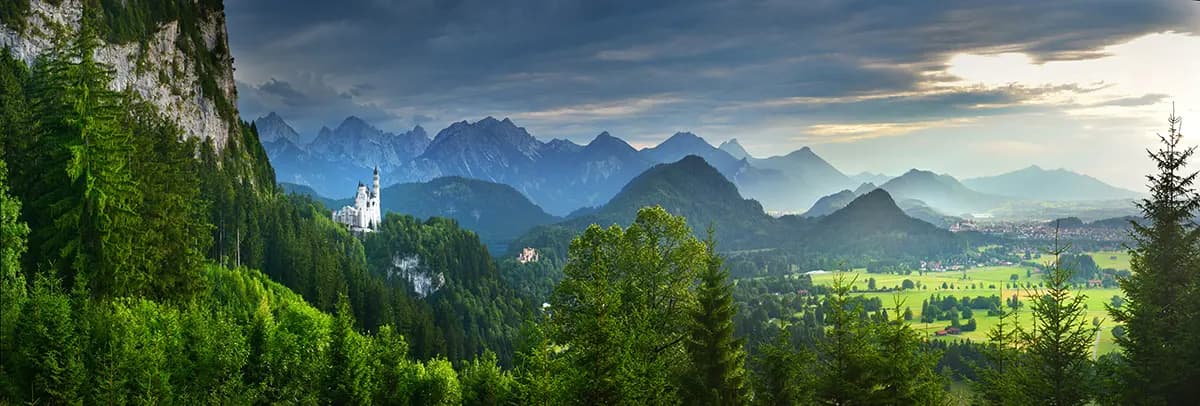
The iconic Neuschwanstein Castle, King Ludwig II's fairy-tale palace that inspired Disney, set against the majestic Bavarian Alps
© denis_333 / Adobe Stock
Bavaria (Bayern), Germany's largest state, combines Alpine majesty with fairy-tale castles, world-famous beer culture, and vibrant cities where centuries-old traditions thrive alongside modern innovation. From the soaring peaks of the Bavarian Alps to the baroque splendor of Munich, from King Ludwig II's romantic Neuschwanstein Castle to the medieval streets of Nuremberg and Regensburg, Bavaria delivers the quintessential German experience travelers dream about—lederhosen and dirndls at Oktoberfest, centuries-old beer halls serving massive pretzels and wheat beer, Christmas markets glowing beneath Gothic spires, and mountain lakes so pristine they mirror surrounding peaks in perfect clarity.Read moreRead less
Discover Bavaria
Things to Do & Experience
Conquer the Zugspitze (Germany's highest peak at 2,962m) via cable car or cogwheel train, ski world-class slopes in Garmisch-Partenkirchen, hike the Partnach Gorge's dramatic limestone walls, and explore Berchtesgaden National Park. Summer brings mountain hiking through wildflower meadows to alpine huts serving kaiserschmarrn, while winter transforms the region into skiing paradise with traditional villages offering authentic Alpine culture, wood-carved architecture, and hearty mountain cuisine.
Tour King Ludwig II's fantasy castles: Neuschwanstein (the Disney-inspiring cliff-top palace), Linderhof (rococo jewel with grotto and Moorish kiosk), and Herrenchiemsee (Versailles replica on an island). Explore Munich's Residenz (former royal palace with treasury and theaters), Nuremberg's Kaiserburg commanding the medieval city, and dozens of smaller castles and palaces showcasing Bavarian rulers' wealth, artistic patronage, and architectural ambition across centuries.
Experience authentic Oktoberfest in Munich (16 days late September-early October) in massive beer tents serving specially brewed Oktoberfest beer, traditional music, and Bavarian cuisine. Visit historic beer halls like Hofbräuhaus and Augustiner-Bräu year-round, tour brewery museums, explore monastery breweries (like Andechs and Weltenburg), enjoy beer gardens under chestnut trees, and learn about the Reinheitsgebot (beer purity law) that has governed Bavarian brewing since 1516.
Wander Rothenburg ob der Tauber's intact medieval walls and half-timbered streets, explore Regensburg's UNESCO-listed old town with 12th-century stone bridge, visit Nuremberg's restored medieval center and castle, discover Bamberg's baroque architecture and unique smoked beer, and tour Würzburg's magnificent Residenz palace. Drive the Romantic Road connecting Germany's most picturesque medieval villages, wine towns, and castle-topped hills across 350 kilometers.
Cruise emerald-green Königssee in Berchtesgaden National Park to St. Bartholomä chapel surrounded by vertical cliffs, visit King Ludwig's island palace on Chiemsee (Bavaria's largest lake), swim and sail on Starnberger See and Ammersee near Munich, and explore lakeside resort towns offering beach clubs, water sports, cycling paths, and Alpine panoramas. Summer lake tourism combines pristine swimming with mountain scenery and traditional Bavarian hospitality.
Visit Germany's most famous Christmas markets: Nuremberg's Christkindlesmarkt (traditional crafts and gingerbread), Munich's Christkindlmarkt at Marienplatz (glühwein and roasted almonds), and Rothenburg's Reiterlesmarkt (year-round Christmas spirit). Browse wooden stalls selling hand-carved ornaments, blown glass decorations, and traditional toys beneath twinkling lights and towering Christmas trees, experiencing the German Christmas tradition that inspired the modern holiday celebration worldwide.
- •Oktoberfest runs late September to early October (not October!) and requires advance hotel reservations months ahead—Munich hotels fill completely, prices triple, and beer tent tables should be reserved for weekends.
- •Bavaria is culturally conservative—traditional dress (lederhosen for men, dirndls for women) is genuinely worn on Sundays and festivals, not just tourist costume. Respect local customs and traditions.
- •Beer halls close kitchens earlier than you'd expect (often 9-10 PM) but beer service continues late. Arrive before 8 PM for dinner, especially at famous venues like Hofbräuhaus which fills with tour groups.
- •Sunday is a genuine rest day—most shops close (except tourist areas), businesses shut, and even some restaurants have limited hours. Plan accordingly and respect the quiet Sunday atmosphere.
- •Bavaria uses the formal 'Sie' much more than northern Germany—address strangers formally until invited to use 'du', particularly with older people and in traditional settings.
- •Regional dialect (Bayerisch) differs significantly from standard German—even German speakers from other regions struggle. English is widely spoken in tourist areas, but learning basic German phrases helps.
- •Neuschwanstein requires timed entry tickets—book online weeks in advance for summer visits. The uphill walk from parking to castle takes 30-40 minutes; horse carriages and shuttles available for those unable to walk steep inclines.
- •Public transportation is excellent—Munich's MVV network (S-Bahn, U-Bahn, trams, buses) plus regional trains make car-free travel feasible. Bayern-Ticket offers unlimited regional train travel for groups at bargain prices.
- •Alps weather changes rapidly—bring layers even in summer. Mountain peaks may be 15-20°C cooler than valleys, and afternoon thunderstorms develop regularly June-August.
- •Tipping culture: round up to nearest euro for drinks, 5-10% for meals. Service is included but small tips appreciated. Pay directly to server, stating total including tip.
- •Alpine areas require proper footwear—many hiking trails are serious mountain routes, not casual walks. Check difficulty ratings, weather forecasts, and bring appropriate gear including waterproofs.
- •Christmas markets traditionally run from late November until Christmas Eve (December 24), not through New Year. Plan accordingly if holiday markets are your focus.
1 city with detailed travel information